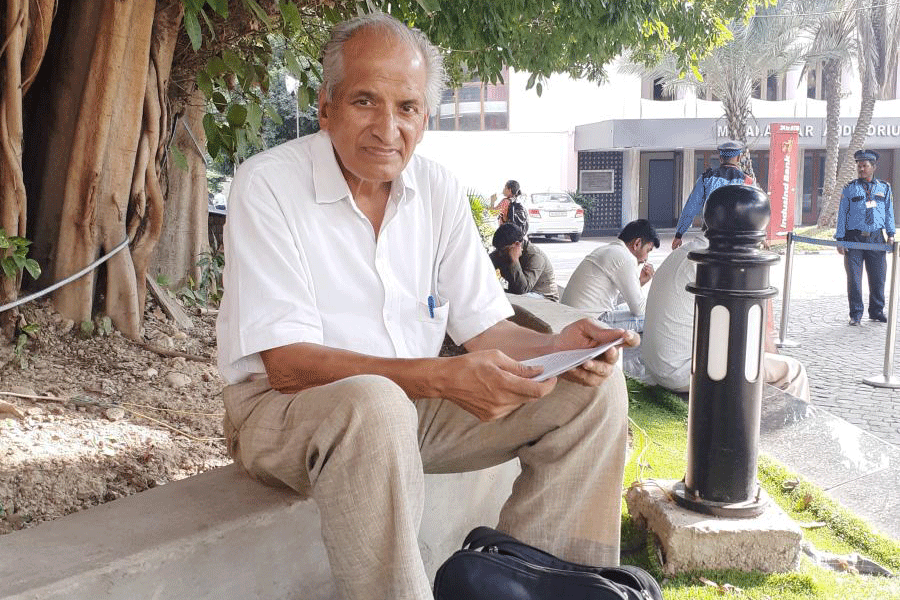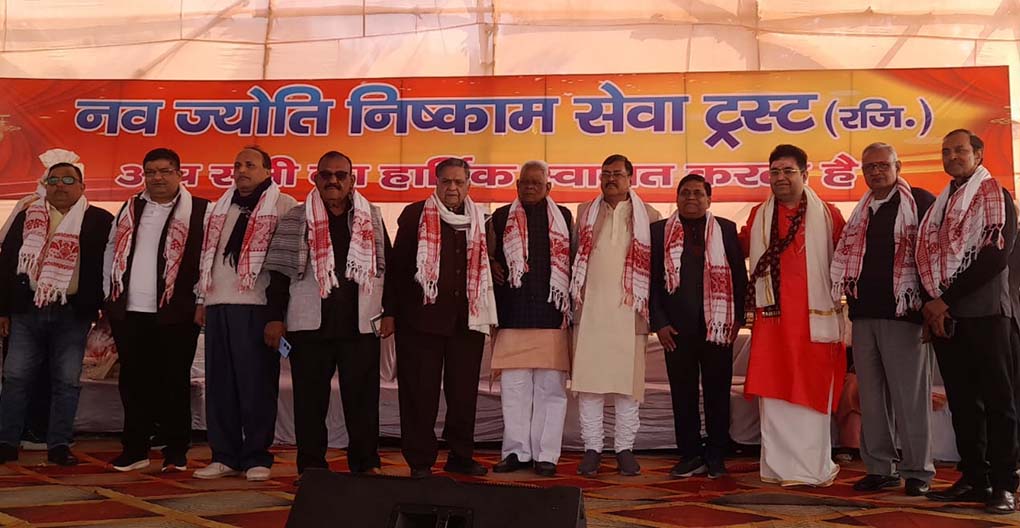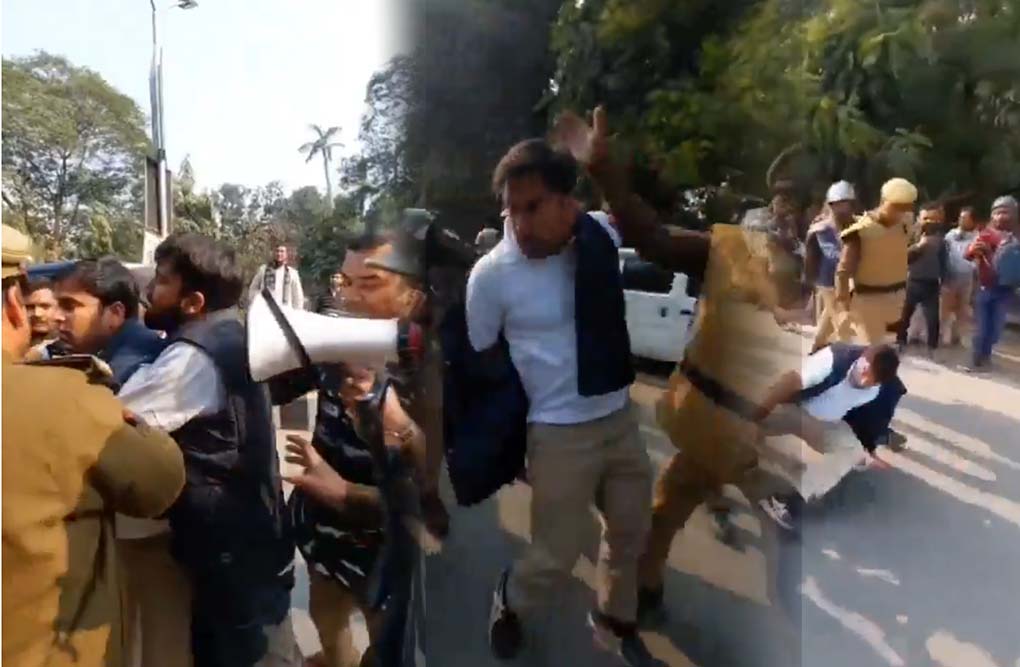Farhan Siddiqui (Exec. Editor)
“Vasudhaiva Kutumbakam” – the timeless Indian philosophy that envisions the world as one family – is a principle that inspires unity, empathy, and solidarity for all of humanity. Yet, in today’s world, those who truly embody this ideal are rare. One such individual is 77-year-old Professor V.K. Tripathi, who has been tirelessly raising awareness about the genocide and starvation in Gaza through peaceful means. Shockingly, his noble efforts were met with humiliating treatment from the Delhi Police, raising serious questions about our society and system’s attitude toward such individuals.On August 15, 2025, India’s Independence Day, Professor Tripathi observed a day-long fast at Rajghat. His aim was to draw attention to the starvation and violence in Gaza. Armed with a simple banner, he sat quietly, creating no disturbance or chaos. However, around 6 PM, Delhi Police officers approached him and treated him in a manner that suggested he was committing a grave crime. This incident, in a country that proudly chants “Vasudhaiva Kutumbakam,” is not only distressing but also prompts reflection on the state of our values.
Professor V.K. Tripathi: A True Soldier of Humanity
Professor V.K. Tripathi, a retired academic and social activist, has long been dedicated to social justice and human rights. At the age of 77, he continues to raise his voice not only for issues in India but also for injustices worldwide. The ongoing crisis in Gaza has deeply affected him. The reports of starvation, bombings, and oppression there have compelled him to act. For months, he has been distributing pamphlets on Delhi’s streets, speaking at small gatherings, and organizing peaceful protests to raise awareness about this issue.On August 15, as the nation celebrated Independence Day, Professor Tripathi chose to fast at Rajghat to highlight the plight of Gaza’s people. His intention was to bring their suffering to the attention of Indian citizens, using nothing but a banner and some leaflets – no slogans, no violence. Yet, the Delhi Police’s response was to confront and humiliate him, raising the question: why was a 77-year-old man, advocating for humanity, treated so poorly?
Delhi Police’s Conduct: A Cause for Concern
Around 6 PM, Delhi Police officers approached Professor Tripathi. According to sources, they not only questioned his peaceful protest but also behaved disrespectfully, asking him to remove his banner. Why was a senior citizen, peacefully expressing concern for a global humanitarian issue, treated as if he were a criminal?This incident raises several questions. Is the right to peaceful protest not guaranteed in India? Is raising a voice for humanity now considered a crime? The Delhi Police’s conduct was not only unjust to Professor Tripathi but also casts doubt on the values of Indian democracy, which champions freedom of expression.
The Gaza Crisis: A Global Tragedy
The crisis in Gaza is no new issue. For years, its people have endured violence, bombings, and starvation. Reports from the United Nations highlight that millions in Gaza are struggling with shortages of food, water, and medical supplies. The situation is particularly dire for children and women. Individuals like Professor Tripathi are working to bring this tragedy to the world’s attention, urging the global community to provide humanitarian aid.Professor Tripathi believes that India, a proponent of world peace and humanity, should take a leading role in addressing this issue. He says, “We are one family. What is happening in Gaza is our collective responsibility. If we remain silent, our humanity remains silent too.”
Society’s Attitude: Apathy or Awareness?
In today’s fast-paced world, people are so consumed by personal struggles that global issues often go unnoticed. Yet, individuals like Professor Tripathi remind us that humanity knows no borders. He is raising his voice against injustice thousands of miles away, while many of us ignore even the issues in our own backyard.His efforts have garnered praise from some sections of society. On social media, many have lauded his courage and dedication. One user wrote, “People like Professor Tripathi make this world a better place. We need to stand with him.” However, others dismiss his activism as a “foreign issue.” This begs the question: do we truly believe in the principle of “Vasudhaiva Kutumbakam”?
Delhi Police’s Role: Need for Reform
The treatment meted out to Professor Tripathi by the Delhi Police was not only wrong on a personal level but also reflects the mindset of our police system. The police’s role is to ensure public safety and maintain law and order, not to harass peaceful protesters. This incident underscores the urgent need for police reform.The police must recognize that peaceful protests are a cornerstone of democracy. Individuals like Professor Tripathi, who express their views without violence, deserve respect and protection, not humiliation.
Professor Tripathi’s Message: A Call for Humanity
Professor Tripathi’s message is clear: “We must save humanity. What is happening in Gaza is not just Gaza’s issue; it is an issue for all of humanity.” He urges the people of India to become aware of this crisis and raise their voices for peace and justice on a global scale.His fast and awareness campaign are not only for Gaza but also an inspiration for the world. He teaches us that age, circumstances, or societal pressures are irrelevant when it comes to standing up for humanity.
Conclusion: An Inspiration, A Challenge
People like Professor V.K. Tripathi are rare in today’s world. At 77, when most choose a life of comfort, he is out on the streets fighting for humanity. However, the Delhi Police’s behavior forces us to question whether our society and system truly value such individuals.”Vasudhaiva Kutumbakam” is not just a slogan; it is a responsibility. Professor Tripathi is reminding us of that responsibility. We must stand with him, support his efforts, raise our voices on the Gaza issue, and work toward a better, more humane world.Hats off to you, Professor Tripathi! Jai Hind, Jai Humanity!



